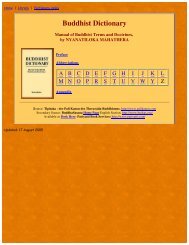The Three Basic Facts of Existence II: Suffering (Dukkha) - Buddhist ...
The Three Basic Facts of Existence II: Suffering (Dukkha) - Buddhist ...
The Three Basic Facts of Existence II: Suffering (Dukkha) - Buddhist ...
- No tags were found...
Create successful ePaper yourself
Turn your PDF publications into a flip-book with our unique Google optimized e-Paper software.
that there are people who kill for “sport” and excitement, steal in order that they may enjoythemselves, in the name <strong>of</strong> pleasure indulge themselves sexually in unwholesome ways, lie andslander to gain happiness, and to achieve the highest bliss get drunk or take drugs to attainaltered feelings and perceptions. But surely these ways <strong>of</strong> action, opposed to the five precepts,make up the path to unhappiness!Now let us take a close look at dukkha and the various ways in which we come up against it.In the texts which record the words <strong>of</strong> the Buddha, we find one passage many times repeatedwhich describes the range <strong>of</strong> dukkha. Here it is, first in Pali then in an English translation:“jātipi dukkhā, jarāpi dukkhā, byādhi pi dukkhā, maraṇaṃ pi dukkhaṃ; soka-parideva—dukkhadomanass-upāyāsāpi dukkhā, appiyehi sampayogo dukkho, piyehi vippayogo dukkho, yam-p’icchaṃna labbhati tampi dukkhaṃ; saṅkhittena pañcupadānakkhandhā dukkhā,Birth is dukkhā, decay is dukkha, disease is dukkha, 2 death is dukkha; sorrow,lamentation, pain, grief and despair are dukkha, association with the disliked is dukkha,separation from the liked is dukkhā, not getting what one wants is dukkhā, in brief, thefive grasped-at-groups are dukkhā.”Here, we are not concerned at all with theory, but with the basic experience <strong>of</strong> our lives. Onemight think that such well-known facts need no stressing, were it not for the mind’s tendency toavoid considering them if possible. As this is so, each <strong>of</strong> these phrases will be described belowso as to bring them into sharp focus. <strong>The</strong>re is an advantage in this, for a certain amount <strong>of</strong>happiness arises from knowledge about life as it really is. Rather than deceiving oneself aboutlife, which is indeed the way to more misery, one should be fearless and face up to dukkha.Though it may seem strange to some people, this is the path to happiness. How many timeshave we seen the Buddhasāsana called “gloomy and pessimistic” because it emphasises that oneshould look straight at the dukkhā, in oneself? But how this contradicts reports about <strong>Buddhist</strong>people—their happiness and imperturbability which is remarked upon by to many visitors to<strong>Buddhist</strong> lands!Some time in the past we were born. Now, birth (jāti), has special meanings from a <strong>Buddhist</strong>point <strong>of</strong> view. Generally it refers to parturition but when the Buddha says that “birth isdukkha,“ He refers to the whole period from conception to extrusion from the womb. <strong>The</strong>whole process <strong>of</strong> nine months or so is continuous experience <strong>of</strong> dukkha.Some people are under the impression that the womb is a cosy little home where a being iswell sheltered and comfortable; even that it is a place to which we desire in life to return as aretreat from problems and difficulties. But <strong>Buddhist</strong> texts give a very different picture. <strong>The</strong>classic description is in “<strong>The</strong> Path <strong>of</strong> Purification,“ Ch. XVI paras. 37–40, where the womb ispictured as anything but pleasant. As Venerable Buddhaghosa <strong>The</strong>ra says: “ … when this beingis born in the mother’s womb, he is not born inside a blue, red or white lotus, etc. … ” butsurrounded by all the unattractive collection <strong>of</strong> tubes and lumpish organs with which the skin isstuffed. Even then there are more attractive parts <strong>of</strong> the body than the belly where digestion andexcretion are also taking place.<strong>The</strong> womb might be considered a pleasant place if the being to be born had never livedbefore. If, as western religion theorises, a man begins life in the womb with the soul implantedthere by God and the material inheritance from parents as the only causes, or as westernpsychology assumes that the material inheritance alone is sufficient cause, then the womb mightseem bearable. But none <strong>of</strong> such views will suit a <strong>Buddhist</strong>. We understand that beings arereborn in accordance with their past kamma. Now, take the case <strong>of</strong> a man, intelligent and2Not all lists include this phrase “disease is dukkha,“ since there are some people, like the VenerableBakkula, in whom bodily disease does not occur.6
















